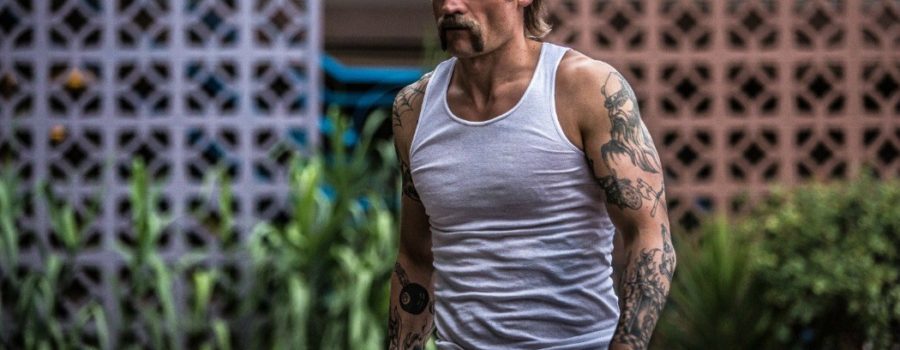[Originally published at Film Inquiry] Director Ric Roman Waugh is no stranger to gritty prison dramas. The former stuntman wrote and directed Felon and Snitch, both of which explore the animalistic nature in humanity through the shortcomings of the American penal system. However, in the four years since Snitch, Waugh seems to have shed some of the clichés that have hindered not only his previous prison-centric films, but also prison films in general. With Shot Caller, Waugh provides a shockingly realistic portrayal of a flawed, regressive penal system that not only focuses on punishment over rehabilitation and treatment for its guilty inmates, but forces morally sound human beings to do the unspeakable to survive.
As a filmmaker, Waugh is committed to portraying the effects that extreme trauma can have on one’s psyche; in 2015, he directed the documentary, That Which I Love Destroys Me, which follows two Iraq War military veterans suffering from PTSD. Those who are imprisoned for years, with the violence that is consistently condoned and willfully ignored by poorly-run penitentiaries, often experience similar, PTSD-like effects that somebody serving in war may experience.
In prison, there is an unspoken code: whatever color your skin is, no matter what your ideologies are, you’re considered a member of the gang that most closely resembles your ethnicity. If you don’t accept that, you have the high likelihood of being murdered for fear of taking anyone’s power away. Of course, those serving small time in minimum security prisons usually don’t have to worry about this dynamic.
In Shot Caller, Nikolaj Coster-Waldau, in an astonishing, tour-de-force performance, plays Jacob, a successful, white-collar businessman sentenced to jail for involuntary manslaughter for running a red light and killing his best friend (Max Greenfield) while driving intoxicated. Subsequently, over the course of ten years, the “human animal” emerges in Jacob; he becomes a ruthless savage, a reluctant pawn in the corrupt, unorganized U.S. prison system.
The Resurfacing Of White Supremacy
Look around you. Turn on the news. Read the average social media thread on a given article from a popular publication. Look at the United States Of America’s president. On top of appealing to a misguided, desperate working class that has been ignored by large corporations, the asshole-in-chief’s rise to power was directly correlated to the overwhelming support from white supremacists. As a result, after his win, an entire population, largely dormant for decades after social progress prevailed over prejudice, was given a voice, one that Trump consistently empowers by showing his support through his obscene comments in the media.
It turns out this population in America, who truly are deplorable (yes, I said it; no I won’t take it back), is far larger than anybody in the world thought. The American Civil War ended 152 years ago, either adapt to change, or get out of my country. You are not wanted here by the vast majority of our citizens, you ignorant, perverse excuse for human beings.

Much like what Jeremy Saulnier’s Green Room did in virtually predicting the rise in mobilized racial violence caused by white nationalists, seen everyday in unlawful shootings of minorities by police officers and violent riots and protests, Shot Caller shows with lurid, uncompromising detail how unnervingly organized white nationalism has become in American society. In Jacob’s prison, the neo-nazi gang runs the prison, controls most of the guards, and dictates who lives or dies. Coster-Waldau, pasty with blonde hair, seems to be the ideal recruit, especially given his character’s financial savviness, hence his nickname, “Money.”
The Human Animal
Jacob does what he has to. Alas, petty crimes evolve into life-altering acts of atrocities. Once you’re in the gang, you can’t leave. Throughout Shot Caller, a fictitious book is referenced, titled The Human Animal. Its author, Kieran Sequoia, was actually an assistant production coordinator on the film’s crew. If the title of the book sounds familiar, that’s because it’s actually based on a real novel.
Written by anthropologist Raoul Weston La Barre (many of whose views were, not surprisingly, offensively outdated), The Human Animal essentially decries that “man” is closer to its primate ancestor than we think, and that social constructs and appropriate human behavior are simply superfluous, evolutionary defects in our species. In placing this subtext within Shot Caller, Waugh underscores the life-threatening necessity for the immediacy of Jacob’s adjustment in prison society to survive his lengthy sentence.
What does this mentality lead to for Jacob? Nothing remotely good. Upon his release, he is forced to fulfill the vindictive and violent orders of his white supremacist gang’s superiors. What separates this from a run-of-the-mill “breaking bad” storyline? There isn’t one morsel of Jacob’s pale flesh that embraces his white-nationalist alter-ego. It is a front to separate himself from his family for their safety; the entire film, every action committed by Jacob is done to cut the proverbial chord. Jacob knows it’s in his wife (Lake Bell), son, and daughter’s best interest to forget about his existence.
No Respite For Coster-Waldau And The Crew
Finally, Coster-Waldau has found a role worthy of his range. Playing an incestuous knight on Game Of Thrones has given him fame, but, ironically, it’s limited work as an actor. Coster-Waldau clearly doesn’t want to be the “Jaime Lannister” of the film industry: all looks with no hand to execute his artistry. As such, he’s surrounded himself with talented filmmakers and actors, accepting less-flattering roles, learning from his peers, perfecting his craft.
Though, at a certain point, one has to assume that Coster-Waldau has had his acting chops perfected for quite some time now. In Shot Caller, there is not the slightest inclination that Coster-Waldau wasn’t born in America. He was born in Rudkøbing, Denmark, yet he can fake an English or American accent so convincingly, it seems almost an impossible feat. How it is possible for actors like Coster-Waldau to accomplish this mastery of language remains an enigma to me. Not even fellow countryman Mads Mikkelsen can pull off an American accent quite that well.

Ken Diaz deserves immense credit for his work as the Makeup Department Head and tattoo designer. He flawlessly ages Coster-Waldau ten years (with an extra five or ten added on due to stress endured during Jacob’s time served). Furthermore, Katie Douthit’s hair-styling is tonally synchronous with Waugh’s ingenuity. Not only is her natural greying of head and facial hair believable, but her choice of consistently long hair for Jacob is meant to symbolize his character’s denouncement of his own “gang,” their beliefs, and the unspeakable actions he’s committed in the name of violence for violence’s sake. Speaking of which, there will be blood; Shot Caller‘s visceral gore is not for the faint of heart.
Jacob remains ideologically and physically different amongst his racist counterparts. Speaking of physicality, it appears Coster-Waldau underwent some sizable body transformations, embracing Lee Strasberg’s famous method acting approach used by so many legends (Marlon Brando, Robert De Niro, etc.). He begins the film scrawny and clean-cut, considerably void of any crease or unwanted facial hair. By the end of Shot Caller, the audience sees a grizzly, bulkier Coster-Waldau at least 30 pounds heavier in muscle-mass. Either it’s a work of camera wizardry by Waugh and cinematographer, Dana Gonzales, or Coster-Waldau went the distance.
Along with this physical transformation assisted by key off-camera crew members, there is an essential emotional astuteness that Coster-Waldau brings to Shot Caller. Without it, the film wouldn’t have the effect it needs to articulate its message. He switches audaciously from feigning his best tough-guy face around his fellow inmates, to quietly sobbing in the dark corner of his isolated jail cell.
The Paradox Of Duality
Gonzales uses lighting particularly well to highlight not only Coster-Waldau’s aforementioned change in physique, but to subliminally invite the audience to experience his isolation with him by using lighting to cast shadows in his literal and figurative jail cell, separating the lightness from the darkness, signifying his conflicted, inner moral duality.
After all, Shot Caller is a character study, and, accordingly, Coster-Waldau is in 99% of the film. He does the film’s speaking for itself even when there is no dialogue, so much so that Antonio Pinto composes a subtle, foreboding score that makes room for such a large onscreen presence. A score that isn’t competing for volume allows the viewer to hang on every mumble, whisper, or slight of body language that Coster-Waldau provides.

Though it fortunately paid off because of Coster-Waldau and the crew’s commitment to a singular vision expressed by Waugh, this plot formula for such an intense and close character study, by default, ignores an underutilized secondary cast. Bell, Greenfield, Benjamin Bratt, and Jon Bernthal do not get enough screen time, particularly Bell and Greenfield. Their characters are all one-dimensional. As the wife, Bell is only provided with so many scenes onscreen to sell the family drama aspect of Shot Caller well enough. However, thankfully she’s an extraordinary talent, so she reads far more in between the lines than most actors would do in a similar role.
Waugh deserves immense credit for tackling pressing themes of institutional racism, segregation, and the lack of humane care of mental health in the age of modern medicine. He doesn’t always execute these themes palatably for the viewer, however, as the narrative time-jumps and editing out of secondary characters inhibits his subtexts.
What Shot Caller lacks for, narratively, it makes up for in its complex character study expertly guised as a prison drama, displaying human nature’s animalistic tendencies and humankind’s manufactured prejudice perpetuated by petty cross-cultural differences. Shot Caller is essential viewing, and one that will leave an unsettling but necessary, lasting impact on the viewer, providing them with plenty of philosophical ammo to play with.
Did you find Shot Caller engaging? What is your favorite Waugh film? Favorite Coster-Waldau performance? Tell us you thoughts in the comments below!
Shot Caller was released on digital streaming platforms on August 18, 2017 in the United States. For all international release dates, please click here.








Leave a Reply
Your email is safe with us.